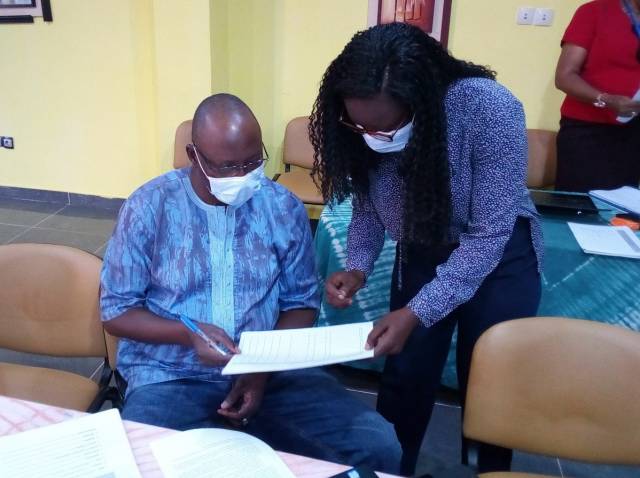You are here
Analytics Training Provides Critical Tools to Fight Meningitis
The meningitis surveillance consortium MenAfriNet and the international non-profit organization Jhpiego recently partnered to sponsor a five-day intensive training session in Burkina Faso for regional public health professionals. The workshop, which took place in early August in Bobo Dioulasso, was centered on building participants analytic skills and capacity to assess surveillance data on cases of bacterial meningitis—a disease that continues to have a devastating impact in countries across Sub-Saharan Africa.
Bacterial meningitis is a brutal infection that advances quickly—causing inflammation in the brain and spinal cord. One in 10 people afflicted will die and many of those who survive suffer from long-term effects, including deafness and seizures. Significant progress has been made in controlling bacterial meningitis in the Sub-Saharan African region, including the successful introduction of a vaccine for Neisseria meningitidis serogroup A in 2010. But unfortunately, an estimated 470 million people remain at risk of infection due to other bacterial meningitis pathogens.
Widespread surveillance, which includes data collection and analysis, is one of the most critical tools in the ongoing fight against bacterial meningitis. In 2013, the CDC Foundation received an initial grant from the Bill & Melinda Gates Foundation to ensure the availability of high-quality meningitis surveillance data in Africa. This led to the establishment of the MenAfriNet Consortium, an international partnership of public health organizations working together to improve surveillance and monitor the impact of meningitis, as well as meningitis vaccination programs, across several African countries where the incidence of the disease is high.
The August training was part of this ongoing effort to strengthen local surveillance capabilities. The program specifically focused on teaching participants how to use R software—a comprehensive system for data analysis that’s also free. This software is especially useful for researchers in countries with limited resources to analyze bacterial meningitis surveillance data.
Facilitators from the government of Burkina Faso developed the curriculum, which covered installation of the R system, introduction to its basic features, and instruction on how to create variables and clean data. Participants were also given hands-on exercises, for which they used real meningitis surveillance datasets from Burkina Faso and Niger.
At the start of the workshop, most participants had never used R before. By the end of the training, they had learned a variety of data analysis skills, including how to recode variables, assess missing and duplicate data, and fix erroneous formats. Additionally, they learned how to create variables to calculate meningitis performance indicators established by health officials within the MenAfriNet consortium and gained skills in basic merging, exporting of data, and creating explanatory graphics such as bar graphs, histograms, and pie charts.
“The R platform is user friendly and accessible, which makes it invaluable in public health work like this,” said Dr. Boukary Ouedraogo, director of Health Information Systems at Burkina Faso’s Ministry of Health. In just a few days, participants were able to gain essential graphing skills. These skills will allow them to use data to detect meningitis outbreaks and respond rapidly, and also to identify long term trends in the disease over time.
I found this training to be very relevant. It responded to the needs of those involved in surveillance work—especially those involved in meningitis surveillance.
Among those participating in the session were public health workers from Niger, staff from the Burkina Faso Ministry of Health, members of the local non-profit Davycas, and representatives from the World Health Organization (WHO).
“I found this training to be very relevant,” said attendee Clement Lingani, a member of the WHO Inter-Country Support Team in Burkina Faso. “It responded to the needs of those involved in surveillance work—especially those involved in meningitis surveillance.”
Given the success of the R workshop, an ongoing series of similar trainings will be offered with the goal of strengthening bacterial meningitis surveillance in the African countries most impacted by the disease. With these critical skills, software and information, public health workers can continue to effectively fight outbreaks and move us closer to defeating meningitis.

